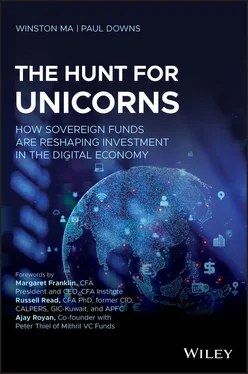Studies have since examined the other detrimental effects of commodity dependence and ways to mitigate its effects. Moving the commodity cash to a sovereign investment fund is one approach , which may save some of the natural resource wealth for the benefit of future generations while promoting a diverse and sustainable economy after the resources are exhausted. By investing strategically in the domestic economy, a sovereign investment fund can encourage a more diversified export sector.
Sovereign wealth funds have also long been deployed to fight more metaphorical health risks. By investing overseas, savings funds in commodity-rich countries can also help prevent Dutch Disease, whereby a surge in commodity exports leads to a sharp rise in foreign exchange inflows, generating inflationary pressures and damaging the competitiveness of other economic sectors (see Box: Dutch Disease). With natural gas reserves dwarfing those of the Netherlands and a much smaller economy, Qatar has followed this approach and invests its massive surpluses abroad.
In 2019, the Qatar Investment Authority (QIA)reportedly acquired the stately St. Regis Hotel, steps from the Trump Tower on New York City's Fifth Avenue, one in a string of trophy hotel properties snapped up with funds from abundant natural gas exports of the lightly populated sheikdom. This is clearly a move that fits well within the accepted paradigm: a prime property in a global city functioning as a store of wealth for a small country in an unstable region. It also demonstrates that being a global investor when a pandemic hits may have its downside. Unlike the more recent move by PIF on Carnival Cruises, however, the timing of the move into hospitality could have been better. But a long-term investor will not worry. In fact, Qatar has reportedly borrowed £10 billion in anticipation of pursuing foreign assets at bargain prices.
Another source of savings in trade-based economies like China, is foreign exchange reserves accumulated from import and export. The “made in China” companies sell their goods overseas – shoes and jeans, or assembled iPhones and laptops – to American and European buyers, bringing back dollars or other foreign currencies. Then the central bank intervenes by printing local currency and buying the dollars for cash from the exporting companies. Traditionally, the central bank, through its investment arm SAFE (State Administration of Foreign Exchange), mostly invested the dollars in the US government treasuries for safety and liquidity. As China's reserve reached trillions of dollars (at its peak, an astounding $4 trillion), the second sovereign fund, China Investment Corp (CIC), was established in 2007 to seek better risk-adjusted returns.
Second, fiscal stabilization funds.SWFs in this category aim to facilitate the fiscal stability of their country's economy, as well as stabilize its exchange rate in certain cases, in the event of an external shock. Often, commodity-rich nations create these funds to manage revenue streams; when commodity prices are high, money goes in, and when commodity prices are low, money goes out – to stabilize the budget. By helping to smooth out commodity revenues, stabilization funds can help governments avoid extreme peaks and troughs in the cycle. These funds are also used to help stabilize the value of the country's currency during macroeconomic shocks.
To fulfil this objective, these funds have short investment time-horizons and tend to hold a large proportion of their assets in liquid investments (and fewer private market investments). This largely limits them to fixed income products, as high exposure to equities and alternatives investments could result in more volatility and less liquidity, putting their ability to intervene on behalf of their economy at risk. The Economic and Social Stabilization Fund (ESSF)of Chile, the copper-rich country in Latin America, is the classic example. Founded in 2007 to repay public debt and fund fiscal deficits, ESSF is not a return-oriented fund, and it has kept its original objective over the years.
This can be seen in action in the 2020 coronavirus pandemic. One of the functions that the oil funds of the Middle East have come to provide is budget stabilization, and they are called back from their day jobs to sustain their home economies. Suffering the double whammy of record low oil prices and the economic shock of the coronavirus, the Gulf states are expected to draw down from their enormous funds to cover government deficits and to fund stimulus spending.
In April 2020, Bloomberg News estimated that bankrolling their governments' stimulus packages, coupled with the decline in asset values and loss of oil surplus inflows, would cause a $300 billion drop in the assets of the funds of Abu Dhabi, Kuwait, Qatar, and Saudi Arabia. With over $2 trillion in assets going into the crisis, they are up to the task. Of course, Wall Street feared that much of the needed cash would be derived from liquidating the funds' massive investments, sending the money managers scrambling to replace the capital on which they have become reliant. In fact, the Gulf SIFs generated even more fees for the money managers by borrowing billions instead of selling at depressed prices. These giants have impacts that reverberate globally.
On the Gulf's frontline in the pandemic battle, the UAE's Mubadala Investment Company (Mubadala)was reported to be in discussions to invest in a rescue package for a troubled local healthcare company, NMC Health, the UAE's largest healthcare provider. While the AI and biotech companies in the portfolios of Mubadala and other SIFs search for cures and preventatives around the world, Mubadala is being called upon to keep the healthcare system afloat at home. In Southeast Asia, oil producer Malaysiais also turning to its sovereign fund, Khazanah, to aid the discount airline Air Asia. Khazanah has been called upon to guarantee loans to the discount airline, which is suffering from the dire effects of the coronavirus on the travel industry.
Norway's Oil Fund, the world's largest sovereign fund, is also at the ready to stabilize its domestic economy. Started in 1996 as a budget stabilization vehicle, the fund has grown to well over twice the country's GDP, hence it is viewed more as an intergenerational savings fund (see Box: Transparency at its Core). However, to cover the massive costs to Norway of coronavirus-induced shock, the fund will be called upon to provide cash directly to fund its government – anywhere from $13 billion to as much as $25 billion or more, as the price of oil, its sole funding source, drops to record lows in 2020.
Norway's Oil Fund could be the dictionary definition of “transparent.” It even once displayed on its website a constantly changing calculation of its market value, spinning like the numbers on a gas pump – or a slot machine. With population statistics, each Norwegian could immediately calculate his or her “share.” And that share is not insignificant. At $1.1 trillion, for a country Norway's size, that works out to over $200,000 per person.
Its dedication to transparency has limited it largely to public markets, unlike its more opaque peers that allocate heavily to private markets for better returns. Initially, bonds comprised the entire portfolio, with the fund moving into a 60/40 allocation in favor of equities just at the dawn of the global financial crisis a decade ago. It promptly lost 23% of its value. During the crisis, the fund doubled down on its equities bet, buying $175 billion of listed shares, representing 0.5% of the world market (and enjoyed a long bull market run). The same tactic may not work in 2020, as the fund will be called upon to perform its budget stabilization function amid the coronavirus pandemic and record low oil prices. The government will call upon 4.8% of the fund's assets to fund pandemic costs.
Читать дальше












